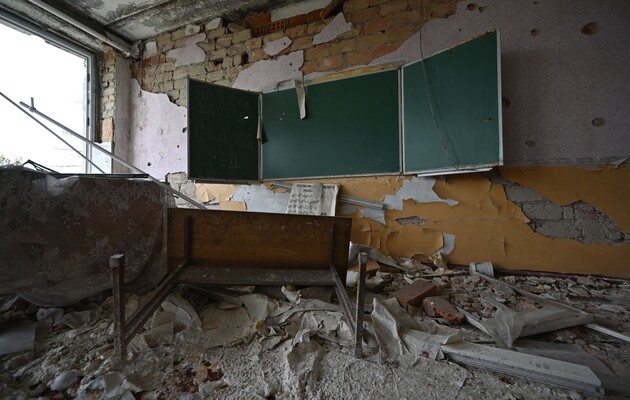Underground Educators. How Children in Occupied Territories Secretly Study in Ukrainian Schools

Now that the war is in its second year, one question is becoming increasingly acute for Ukrainian children: how to get an education according to the Ukrainian curriculum while living under Russian occupation? Most of the Ukrainian online schools, which are currently the only alternative to a live Ukrainian school in the occupied cities, point to the outflow of students.
In particular, according to NikVesti, the number of local schoolchildren in Mykolaiv city who attended Ukrainian online schools has decreased by more than 3,300 students in a year, and these numbers keep growing. At present, only 400 children in the city study in Ukrainian online schools. In Melitopol, Berdiansk and other cities, this tendency is even more prominent... What makes pro-Ukrainian children enter Russian local schools against their own wish?
Back in the day, Volodymyr Zelenskyy advised parents living in the occupied territories to send their children to Ukrainian online schools and, if possible, not to attend Russian educational institutions at all.
Or, if that is not possible, the president advised the families of such children to move to Ukrainian cities controlled by the Armed Forces of Ukraine. However, is it realistic to put this recommendation to practice? And if moving is a step not everyone will venture to take, online schools, it would seem, should be an easier choice from every standpoint. We have collected the main problems that prevent the implementation of such a scenario.
A financial issue
All of us, together with the residents of territories not controlled by Ukraine, were waiting for a counteroffensive of the Armed Forces of Ukraine. Reality, however, has taken a different turn. Having waited for the liberation of our cities, residents of the temporarily occupied regions of Ukraine have come to realize that this process will not be quick, and are trying to build their lives and the lives of their children in the current conditions of uncertainty.
First and foremost, the uncertainty is related to the financial realm. After all, in order for children to use the services of Ukrainian remote learning, which can provide services in an asynchronous mode, one needs to pay. But if the parents take it upon themselves and still decide to send their child to a paid Ukrainian distance school, a question arises: how will they pay for it? The people living in the occupied territories now have only Russian rubles and almost no hryvnias. There is also no access to Ukrainian banks. Of course, Ukraine cannot accept payments in rubles, which is prohibited by law. This is essentially the situation in which children are forced to move into the fold of Russian schools and, consequently, are exposed to the influence of their culture and propaganda.
In Ukraine, it is currently possible to study free of charge only in an online format — i.e., with live lessons conducted by teachers in real time. Sadly, whereas it was a good decision at the beginning of the full-scale invasion, it is not an option anymore – simply due to the fact that the children are forced to attend classes at the local occupation school, so the lesson schedules overlap. If you do not attend a local school, you can face severe consequences from the Russian administration.
An offer from the enemy “one can’t refuse”
A different situation may emerge, which already occurred in Donetsk, Luhansk and Crimea in 2014. At that time, the Ukrainian authorities allowed students to enter Ukrainian universities without external exams and schoolchildren to find a new school in the government-controlled territories with certain concessions during admission. However, many children chose local Russian schools in the same way, and it was often easier for students to go, for instance, to Rostov, Russia, since it seemed closer to them from the territorial standpoint. There, the enrollment was simpler and more clear based on Russian papers, so many chose this path — the path of least resistance. The consequences are clear: after a while, children began to study there and adapt to the Russian system.
Nowadays, there is a very high risk that we will also lose children from the Kherson and Zaporizhzhia regions. It is likely that they will be “brainwashed” and will be enrolled at Russian universities and will stay there for permanent residence. That said, there is also a significant number of conscientious and passionate Ukrainian families, whose children are essentially ready and aspire to acquire education in Ukrainian and be Ukrainians. So what is it that stops them?
Fear of physical violence
If the reports of the pro-Russian authorities in the Zaporizhzhia region are anything to go by, 40,000 students went to school there this year. There are currently 123 schools operating in the occupied areas, in which, according to Russian policy, children must study according to Russian standards. For refusing to study, parents receive regular threats, running the gamut from the application of a system of fines to the deprivation of parental rights and even the removal of the child!
In addition, the Soviet practice of snitching has gained a new lease of life in the occupied territories. According to eyewitness accounts, agents of the Russian authorities often keep an eye on neighbors and children in their yards — did a boy or a girl go to school in the morning with a backpack? If not, why is the child sitting at home for months? A common practice among parents who have dared to send their child to a Ukrainian online school is to listen near the window or door during an online lesson — in case there is suddenly someone walking down the street who can hear the Ukrainian language and report it to the police.
Many parents are indeed afraid for the health and life of their children, and therefore are forced to send them to local mixed schools. However, there is one last reason for such actions, and it is no less important.
Loneliness in the network. Confined within four walls
Until adulthood child's psyche is just forming. During this time, communication and social contacts are of crucial importance. Parents often choose an offline school since they are not sure if the child will sit out so many lessons online, that these lessons will be meaningful and interesting. A question arises: what to do for those who, despite all these difficulties, have a solid feeling that they are Ukrainians and seek to give their children a Ukrainian education?
Two types of distance learning — which one to choose?
Ukraine currently offers children two types of online education: synchronous and asynchronous. What is the difference? Synchronous learning involves live online lessons where the teacher teaches the subject via Zoom in real time. This is how they are now partly attempting to solve the issue of educating children in the occupied territories. The method is ineffective because the child can attend classes only in this Ukrainian school. In turn, parents are often compelled to combine their children's online and local offline education since they realize that if a child does not go to a local Russian school, this can lead to dire consequences. What is the alternative to synchronous learning?
This is a popular asynchronous learning — when a special online educational platform already has all the necessary content, and the child learns at their own pace, when it is convenient for them. All large distance schools of Ukraine offer this kind of training. The child completes the task and the teacher simply checks it afterwards. There is no attachment to any specific schedule. That is, for children from temporarily occupied territories, the asynchronous format of education is the best solution because, firstly, you can study at any time from any place. Secondly, it is simply safer. Parents do not need to choose between their own lives and Ukrainian education for their children.
Task of the state
We at Unicorn School, just as other colleagues from leading distance learning institutions, do our utmost to ensure that children in the temporarily occupied territories have an opportunity to receive a Ukrainian education. Children from all non-government-controlled regions study here – there are even students from Crimea and Sevastopol. However, we understand that without a focused state policy in this area, our efforts will not be able to provide significant results for the reasons described in this article. We as a society now really face an important choice: to leave everything as it is and lose a generation of Ukrainians — or to find an effective mechanism that will help preserve Ukrainian identity in the temporarily occupied territories.
Read this article in russian and Ukrainian.
Please select it with the mouse and press Ctrl+Enter or Submit a bug











 Login with Google
Login with Google